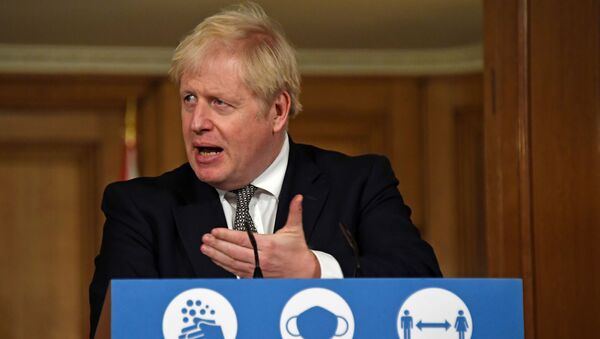UK Prime Minister Boris Johnson marked the first day of England's second lockdown by holding a press conference at Downing Street on Thursday.
Alongside NHS chief executive Sir Simon Stevens, Mr Johnson began the briefing at 5.00pm and stressed the importance of the new measures in curbing the rising cases of coronavirus before the beginning of December.
WATCH LIVE: An update on coronavirus (5 November 2020) https://t.co/9fBoVPoYaq
— Boris Johnson (@BorisJohnson) November 5, 2020
While no new measures have been announced, the Prime Minister updated the nation that the number of new cases has reached 22,398, an increase from 9,716 compared to last month.
12,320 patients are now in hospital, 2,602 compared to last month and 492 deaths were reported on Thursday. The weekly average number of deaths has also risen from 295 up from 53, Johnson said.
He offered sympathy to those impacting saying he know's "how tough this is" but also stressed that this lockdown is "not a repeat of the spring" as schools and universities can all stay open.
“There is light at the end of the tunnel”, he said.
Johnson said that 4 weeks is enough of the measures to make a "real impact" before the UK moves back to a tier system where restrictions are introduced based on the severity of regional outbreaks.
Rapid testing citywide will be introduced in Liverpool from Friday 6 November and there is a "very real chance of safe and effective vaccines" being available soon.
£1.1 billion will be given to local authorities and 2 billion will be provided to devolved governments of Scotland, Wales, and Northern Ireland who are all currently under their own social distancing regimes.
A Resurgent Crisis
Sir Simon Stevens said NHS staff wish to remind the public that the second wave is "real and serious" and the ability of the NHS to provide care depends on the direction of coronavirus cases.
He warned that if left unchecked, too many new hospitalisations will disrupt care.
Sir Stevens says there is generally five days between infection to the symptoms and the number of patients looked after in hospitals across England is rising at a concerning rate.
In September, the number of hospitalizations was under 500, in October it reached 2000, and in November 11000 people were admitted to hospital with coronavirus.
This is contrasted with the typical 3000 during winter with flu and 7000 for cancer
He said that the second wave can be observed throughout the continent with "hospitals across Europe" filling up.
What if a Vaccine Does Not Work?
The prime minister said that they are looking into a variety of measures to keep cases down including therapeutics and medicines and testing regimes if the vaccine doesn't work
New immediate testing means those tested can receive results "within 15 minutes" and help them self-isolate
More than 200 vaccines are in development with 6 frontrunners.
Can Christmas be Saved?
The Prime Minister was asked if it was possible to promise the public a Christmas consisting of meeting families in different households and large gatherings given the rising cases.
In response, he said that if the "overwhelming majority again will follow the rules we will be able to have as normal a Christmas as possible and get things open before Christmas as well".
Private Sector Failure?
A reporter from the Daily Mirror asked if outsourcing the NHS test and trace system to private firms should continue given that the system reached its lowest ever proportion of contacts on Thursday.
The Prime Minister said that capability is up to 500,000 per day and the UK has "biggest diagnostics anywhere in Europe". He added that they have been able to get the R down "in a way we would not otherwise have done".
Since the government began responding to the crisis, it offered the contract for the construction of the UK's test-and-trace app to Serco, a private company that provides services across the public sector.
I asked the Government how many contracts the Department of Health has with Serco, and how much those contracts are worth.
— Richard Burgon MP (@RichardBurgon) November 3, 2020
10 days later I got this reply from the Tory Health Minister - who happens to be Serco's former chief spin doctor. pic.twitter.com/xhIwoM4WHa
Old Slogan, New Lockdown
Boris Johnson concluded up the conference by saying the UK is in a "far far better position to fight the virus than we were in March.
He repeated the original government slogan used back in April, calling on the public to aid in the national endeavor to "stay at home, protect the NHS and save lives".
From today, national restrictions are in force in England.
— UK Prime Minister (@10DowningStreet) November 5, 2020
Click below for all you need to know.
https://t.co/shgzOurdZC pic.twitter.com/teu59b57Vd
When the UK's first lockdown began in May, the prime minister held daily press conferences alongside experts to update the country about the ongoing pandemic. The briefings came to an end however as nationwide restrictions were lifted and new cases began to slow down.
At the 100th conference, the PM indicated that the briefings would once again become a common feature of the government's approach to the crisis, and later announced that televised daily conferences would resume November, headed by Mr Johnson’s spokesperson, former ITV and BBC journalist Allegra Stratton.
In order to circumvent the economic effects of locking down the economy again, Chancellor Rishi Sunak announced earlier on Thursday that the furlough scheme would be extended until the end of March. The Bank of England has also said it will inject £150 billion of stimulus as the UK faces slow recovery and analysts warn of a double-dip recession.
What are the Lockdown Rules?
The new Covid restrictions, which began on Thursday morning, will last for 4-weeks and were introduced with the hope that the second spike of coronavirus could be subdued. Mr Johnson insists that the restrictions will automatically expire on Wednesday 2 December.
Like the first set of restrictions introduced in March, those in England will have to remain at home unless for "essential" purposes such as attending school or college or supermarket trips for groceries.
While manufacturing and construction will continue 'non-essential' businesses such as hospitality and retail will close and their staff unable to go into work. Gyms, leisure centres, and entertainment venues will be shut.
Those who cannot work at home are allowed to go outside to attend the workplace, and outdoor exercise is permitted. Going out for “recreational purposes” within a household or alone with one other person from another household the 'one plus one' is also allowed.
Examples of recreation given were meeting up with another person in the park for a walk or sitting on a bench and eat a sandwich together. Meeting in homes and gardens, however, is in breach of national regulations.
Most businesses are being told to shut, with all "non-essential" shops and entertainment venues all being asked to close during the full tenure of the lockdown.
See below @PhilipDaviesUK challenging the PM on the proposed National Lockdown earlier today in the House of Commons.
— Shipley Tories (@ShipleyTories) November 2, 2020
Clip from https://t.co/dipSi1DnAj. pic.twitter.com/yP5QiqwHCm
Colleges, schools, colleges, and universities will stay open but students in higher-education accommodation must not return home during term time but will be allowed to for the Christmas holiday.
Churches are allowed to hold private prayer and funerals are limited to a maximum of 30 people while weddings and ceremonies are only allowed under “exceptional circumstances”.
Bars, pubs, and restaurants must remain closed with the exception of delivery or takeaway. However, takeaway alcohol is permitted so long as it is pre-ordered online.





